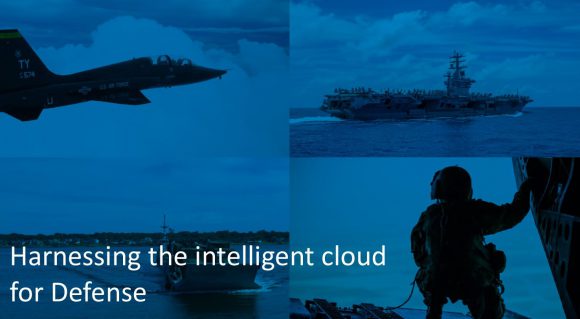Harnessing the intelligent cloud for Defense

The rapid evolution of technology and the exploitation of data, machine intelligence and on-demand computing power is changing the landscape of defense. This is leading to a massive shift in how the United States Department of Defense (DoD) is looking to adopt cloud computing services to rapidly innovate, extend its mission capabilities and stay ahead of its adversaries.
In a September 2017 memo directing the DoD to take steps to accelerate enterprise cloud adoption within the Department, Deputy Secretary of Defense Patrick Shanahan cited the use of commercial capabilities in the areas of data infrastructure and management, cybersecurity, artificial intelligence, and machine learning as critical to maintaining the DoD’s military advantage.
In support of this view, Susie Adams, Microsoft Chief Technology Officer for Federal, commented “The defense industry is at a major crossroads, and AI is fundamental to their ambitions. The key is to be able to extract mission-relevant information and convert that into intelligence.”
Federal civilian government and DoD industry partners are already using Microsoft Azure Government and its best-in-class capabilities in Internet of Things (IoT), machine learning, and analytics to fuel their own digital transformations. Across government agencies, transformation cloud technology is enabling leading edge genomic research, powering smart building initiatives, protecting our citizens and creating operational efficiencies in logistics and manpower scenarios. Enhancing the government mission, the intelligent cloud opens up multiple paths for changing approaches to data.
The proliferation of data from devices and sensors creates both challenges and opportunities. Data today comes from everywhere – from both manned and unmanned platforms, and in form factors ranging from the sophisticated instrumentation on a modern aircraft to the wearable on a solider. This mass of data provides our military with an unprecedented opportunity to derive insights from that data to:
- Improve the reliability of intelligence
- Create situational awareness
- Elevate operational effectiveness
- Prevent cybersecurity attacks
- Empower modern logistics
The challenge, however, lies in ensuring the relevance of the intelligence delivered. Data insights must be delivered securely, in near real-time, and must also be available and consistent regardless of the communications posture. Addressing these logistical and security concerns requires a hybrid cloud platform that provides a common set of tools, services, and techniques across on-premises resources and the cloud. Applications leveraging machine learning and artificial intelligence can offer major benefits, but only if they are accessible under a wide variety of command conditions. The armed services must be able to develop and securely manage applications regardless of whether the application is running at a base/camp/garrison, in the cloud, or is deployed to support a connectivity-challenged tactical unit.
- Azure Government with Azure Stack provides the only truly consistent hybrid cloud platform in the market that can support IoT, machine learning, artificial intelligence and analytics from the cloud to the tactical edge and everywhere in between.
- With Azure’s IoT services, terabytes of data from hundreds of millions of sensor events can be queried alongside volumes of historic data, in seconds, to identify both trends and anomalies to support a rich set of use cases including low-latency command and control situations. Azure IoT Hub provides support for connecting, monitoring and controlling heterogeneous IoT assets through a zero-touch declarative set of interfaces.
- Artificial Intelligence (AI) powered by Machine Learning is one of the most vibrant areas of innovation within Microsoft. Microsoft is making deep investments in infusing artificial intelligence across our computing platforms and experience, to accelerate innovation and help solve the most pressing defense challenges. “At Microsoft, we are creating solutions that are enabled with artificial intelligence from the ground up,” said Susie Adams. Azure Government provides a host of services from preconfigured AI powered APIs (Cognitive Services) to the support for open standards and granular control needed to build custom deep learning networks (Microsoft Cognitive Toolkit).
- Cognitive Services is a portfolio of APIs and SDKs that enable DoD to add intelligent services, such as vision, speech, language, knowledge, and search capabilities to their solutions. These APIs enable you to quickly add the ability to detect objects, match faces, identify speakers, translate text and build linguistic models of the text to understand what was said. These APIs bring the power of data science to every application.
The above capabilities empower the DoD to exploit telemetry and other data generated and collected at the edge. Image and video processing and recognition, document exploitation, and voice translation are all options with edge analytics. All of these capabilities enable teams to derive new intelligence, optimizing mission planning and operations in near real-time as environment changes occur. The portability of the data, models and insight also allows for deeper analysis at a command center, where edge data is analyzed and integrated with data from other sources to enable more strategic, comprehensive battlefield situational awareness. Commanders can make decisions based on this kind of comprehensive intelligence, and those decisions can then be delivered through the chain of command to be executed rapidly on the front lines.
Whether you are a mission commander assessing live feedback from reconnaissance or a logistics expert evaluating anything from historical maintenance trends to the performance of supply lines on the ground, the cloud offers new solutions. In this new defense context, Azure Government provides intelligent innovation to create tremendous mission value and enable the speed and agility in decision-making that the DoD is striving to achieve.
Learn more about Azure Government:
To explore Azure Government, request your free 90-day trial today
See pay-as-you-go purchasing options to get started now.

 Light
Light Dark
Dark
0 comments